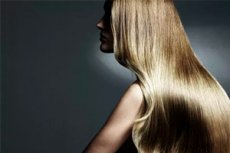Medical expert of the article
New publications
Keratin composition and its role in the cosmetic industry
Last reviewed: 30.06.2025

All iLive content is medically reviewed or fact checked to ensure as much factual accuracy as possible.
We have strict sourcing guidelines and only link to reputable media sites, academic research institutions and, whenever possible, medically peer reviewed studies. Note that the numbers in parentheses ([1], [2], etc.) are clickable links to these studies.
If you feel that any of our content is inaccurate, out-of-date, or otherwise questionable, please select it and press Ctrl + Enter.

Keratin is a fibrillar protein that is a major component in the structure of human hair, skin and nails. This protein is present in various forms in all vertebrates, including humans, and is an important element in providing strength and protection to the cells of which it is composed. The cosmetic industry utilizes keratin for its ability to improve the condition and appearance of hair.
Main constituents of keratin
- Amino Acids: Keratin is made up of long chains of amino acids linked by peptide bonds. Serine, glycine, alanine, cysteine, valine, arginine and leucine are just some of the amino acids that form keratin.
- Sulfur: The amino acid cysteine contains sulfur, and this helps form disulfide bridges between keratin chains, which gives hair and nails their strength and resilience.
- Water: Like many other proteins in the body, keratin also contains water, although it is considered fairly resistant to water compared to other proteins.
- Lipids: Small amounts of lipids are also present in keratin and help maintain its waterproof properties.
- Micronutrients: Various micronutrients such as zinc may be present in keratin, which are essential for its biosynthesis.
Keratin application in the cosmetic industry
- Hair Restoration: Keratin treatments are used to repair damaged hair by filling pores and rebuilding the structure of the hair.
- Hair Straightening: Keratin straightening is a popular treatment that makes hair smoother and straighter, making it easier to style.
- Skin Moisturizing: Keratin is used in skin creams and lotions to moisturize and improve skin elasticity.
Safety and efficacy of keratin products
While keratin products are considered safe for most people, there are certain considerations to keep in mind:
- Formaldehyde: Some keratin treatment products can release formaldehyde during application, which has raised concerns about their safety.
- Allergic Reactions: Like any protein, keratin can cause allergic reactions in some people, especially if there is a predisposition.
Production Source: Keratin can be derived from a variety of sources including animal hair, bird feathers, horns and hooves. Vegan alternatives are also available and the basics of keratin product innovation and development:
With advances in science and technology, new forms of keratin products are emerging in the cosmetic industry that promise to improve the health and appearance of hair and skin. For example, hydrolyzed keratin, which is produced by breaking down keratin into smaller molecules, allows active ingredients to penetrate deeper into the hair and skin structure, providing more intense nourishment and repair.
The role of keratin in hair care
- Protection: Keratin creates a protective layer around the hair to help prevent damage from sunlight, pollution and chemicals.
- Nourishment: Hair naturally contains keratin, so keratin products can replenish the levels of this protein in hair, improving its condition and preventing breakage.
- Moisturizing: Keratin products often contain additional moisturizing ingredients such as glycerin or various oils to enhance hydration and prevent dry hair.
Recommendations for the use of keratin products
When using keratin products, certain guidelines should be followed to achieve the best results and avoid negative effects:
- Consult a specialist: Before using keratin products, it is recommended to consult a trichologist or dermatologist to determine if they are suitable for your hair and skin type.
- Use as directed: Follow the directions on the product packaging to avoid overuse and possible protein accumulation.
- Product Variety: Combining keratin products with other hair care products can prevent keratin oversaturation and keep hair healthy and shiny.
Ethical and environmental aspects
With the growing interest in ethical consumption and sustainability, manufacturers of keratin products are also looking for ways to make their products more environmentally friendly and safe:
- Vegan and Cruelty-Free Products: Vegan keratin products contain no animal derived ingredients and are not tested on animals.
- Packaging: Packaging made from recycled materials and the ability to reuse or recycle packaging is another step in reducing our ecological footprint.
Keratin products continue to be an important element in the hair and skin care routine for many people. When used correctly and chosen with individual needs and ethical preferences in mind, they can significantly improve the quality and appearance of hair. However, it is important to approach this with deliberation and caution, especially if you have sensitive skin or allergic reactions.
Keratin remains one of the key ingredients in hair and skin care products due to its strengthening and protective properties. However, it is important to choose products carefully and take into account individual skin and hair characteristics, as well as possible allergic reactions.

